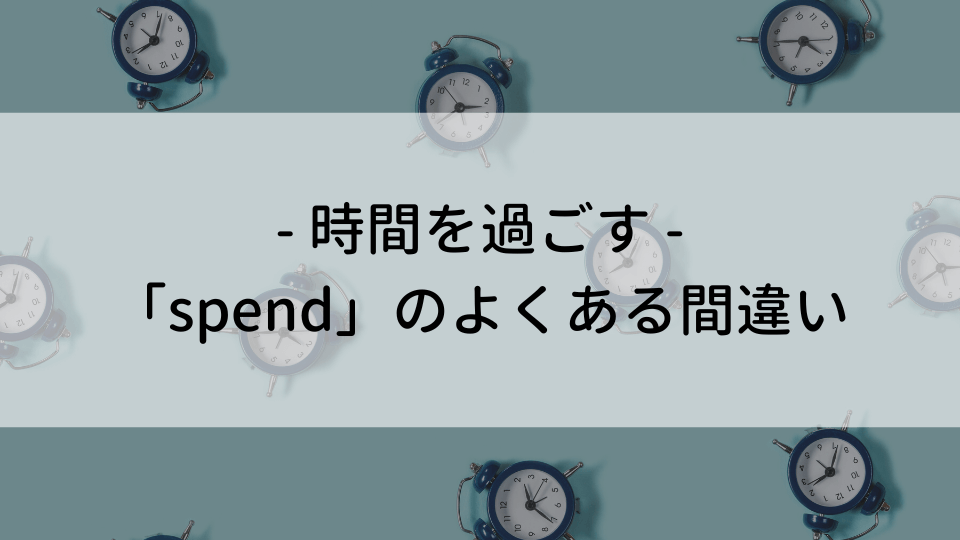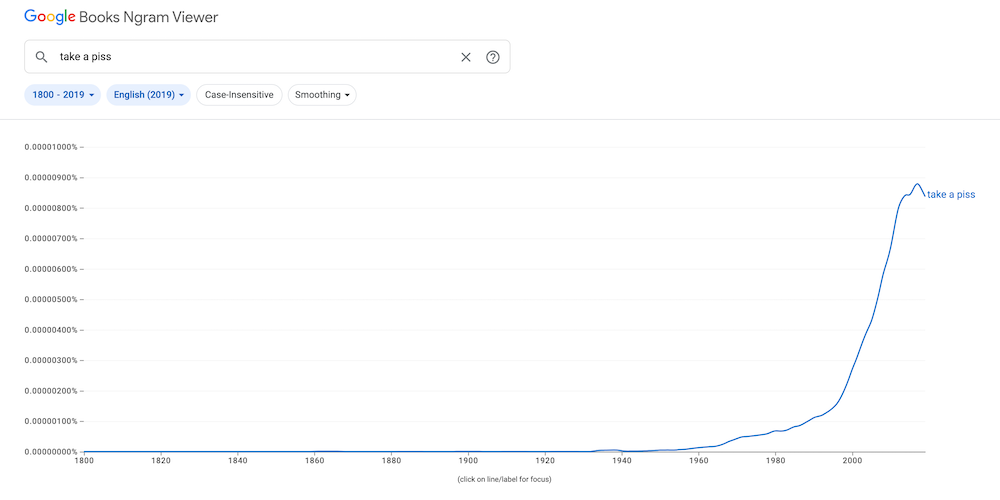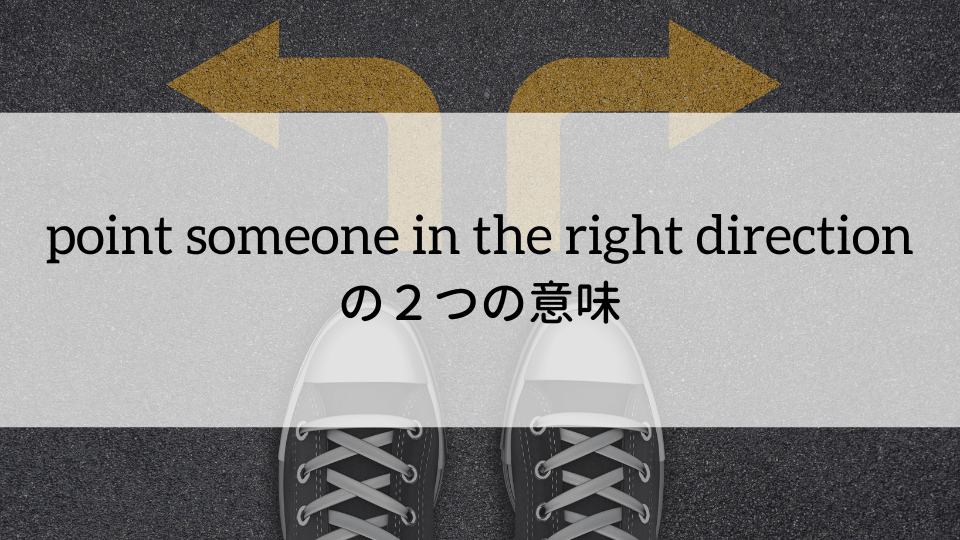みなさん、再びこんにちは!
私が長い間日本で英語講師をしている中で、日本人の英語学習者が間違えやすい間違いのパターンを把握してきました。
これらは通常、日本語からの直訳、学校の授業で教えられること、日本語と英語の些細な文法の違いに関連しています。
幸いなことに、これらは通常、適切な説明を受けることにより簡単に修正できます(必ずという訳ではありませんが)。
私が常に生徒さんに伝えていることの一つは、英語を話すときにこのようなフレーズに注意を払うこと(頭の中に警報が鳴るような感じで)、そしてそれが自然にできるようになるまで正しく使うことです。
今日は「spend」という単語について話します。
「spend」のよくある間違い
「spend」の日本語と英語の使い方の主な違いは、日本語では時間の語句を加える必要はないが、英語では常にそれを加える必要があるということです。
以下に、英語のレッスンでよく耳にする例をいくつかご紹介します。
講師:
How was your weekend?
(週末はいかがでしたか?)
生徒:
I spent at home.
(私は、家で使いました。)
講師:
What are you doing at new year?
(新年は何をしますか?)
生徒:
I’m going to spend with my family.
(家族と使うつもりです。)
英語では、「spend」の後に時間の語句が必要ですので、正しい文章はこのようになります。
I spent last weekend at home.
(週末は家で過ごしました。)
I’m spending new year with my family.
(新年は家族と過ごします。)
上記の文では、「last weekend」と「new year」という「時」を表す語句が含まれています。
英語で「時」を関連づけるとき、「spend」はいつもこのように使われます。
最初の2つの質問に適切に答えるには、「last weekend」と「new year」を代名詞に置き換えます。
【正しい文】
How was your weekend?
(週末はいかがでしたか?)
I spent it at home.
(週末は家で過ごしました。)
What are you doing at new year?
(新年は何をしますか?)
I’m going to spend it with my family.
(新年は家族と過ごす予定です。)
「spend」の内容を修飾
話しているイベントがどのようなものであったかを説明するために、時間の語句の前に形容詞を使用することもできます。
【例文】
I spent a really nice time at John’s house last weekend
(週末は、ジョンの家で本当に楽しく過ごしました。)
I spent a fantastic 2 weeks in France last year and I’d love to go again.
(昨年、私はフランスで素晴らしい2週間を過ごしました。また行きたいと思っています。)
「spend」を使わなくてもOK
最後に注意していただきたいのは、英語では日本語ほどこの「spend」という動詞を頻繁には使わないということです。
なので、「spend」だけを使うのではなく、他の表現も試してみてくださいね。
これらの答えはいずれも全く問題ありません。
Aさん:How was your weekend? (週末はいかがでしたか?)
Bさん:Not bad, just stayed at home. (まあまあです。家にいただけでした。)
Aさん:What are you doing at new year? (新年は何をしますか?)
Bさん:I’ll probably be with my family back in my hometown. (たぶん、故郷の家族と一緒に過ごすと思います。)
お役に立てると嬉しいです。
ジェイミー
実践的な英語ならケンジントン英会話
ケンジントン英会話では、教科書には載っていない、生きた表現を身に付けられます。
福岡市内の教室やオンラインで、経験豊富でフレンドリーな講師と一緒に英語を学びませんか?
実践的な英語を学びたい方はケンジントン英会話の公式サイトをチェック!
[英語原文]
Hello again everyone!
During my lengthy teaching career in Japan I have built up a store of often minor errors that Japanese English speakers tend to make. These are usually connected to direct translations from Japanese, things taught in English classes in schools, or like today’s, little grammatical differences between the two languages. Luckily they are usually easily fixed (don’t hold me to that please) with a decent explanation. One of the things I always tell my students to do is to try to be aware of these kinds of phrases when they speak (kind of like having an alarm bell in your head) and to be careful to use them properly until it becomes second nature.
Today we will talk about the word “spend”. The main difference with the use of this verb in Japanese and English is that in Japanese you don’t need to add a time phrase with it but in English we always do. Here are some examples of what I often hear in class.
How was your weekend?
I spent at home.
What are you doing at new year?
I’m going to spend with my family.
In English you really need a time phrase after the word “spend” so these would be more appropriate answers.
I spent last weekend at home.
I’m spending new year with my family.
In these sentences the times last weekend and new year are understood. The verb spend is always used in this way when relating to time in English. A good way to answer the first 2 questions is to replace weekend and new year with a pronoun.
Like this…
How was your weekend?
I spent it at home.
What are you doing at new year?
I’m going to spend it with my family.
You can also use an adjective in front of the time phrase to describe what the event was like.
I spent a really nice time at John’s house last weekend.
I spent a fantastic 2 weeks in France last year and I’d love to go again.
Finally, please remember though that we don’t really use the verb quite as much as you do in Japanese though so try and mix it up a bit.
These answers are perfectly okay….
How was your weekend?
Not bad, just stayed at home.
What are you doing at new year?
I’ll probably be with my family back in my hometown.
Hope that comes in handy.
Jaimie
~*~*~*~ \ Follow me / ~*~*~*~
Instagram : @kensington_eikaiwa
Twitter : @Kensington_Eng
Facebook : @kensingtoneikaiwa
YouTube : KENSINGTON英会話
~*~*~*~*~*~*~*~*~*~*~*~*~*
◆お問い合わせはこちら
ケンジントン英会話:お問い合わせフォーム











































